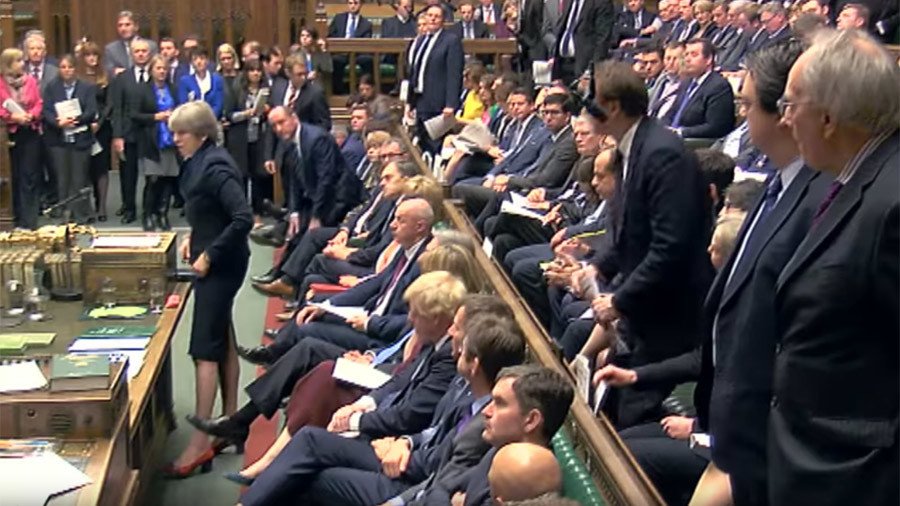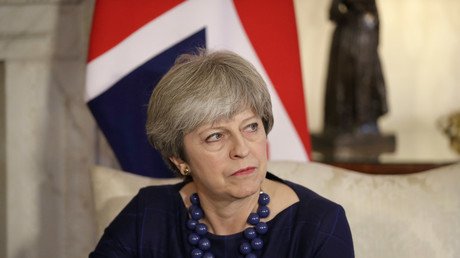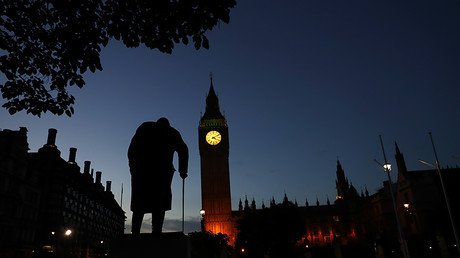May’s Commons defeat: ‘Humiliation’ after ‘govt used Brexit deal to get dictatorial powers’

Such a humiliation of a UK PM in the House of Commons would typically mark the beginning of the end, but neither side of the House is in the mood for an election; Labour is happy seeing the Tories dig their own grave, political writer Dan Glazebrook said.
British Prime Minister Theresa May suffered a major defeat on Wednesday in the House of Commons when members of her own Conservative party defied her in a vote on a key Brexit bill.
The motion was lost by 309 to 305 as lawmakers insisted they should have a legally binding say on any deal the government agrees with the EU. Eleven rebels within her own party broke ranks to give MPs the power to veto any exit agreement.
“This defeat is a humiliating loss of authority for the government on the eve of the European Council meeting,” Labour leader Jeremy Corbyn said in a statement.
RT discussed this defeat with Dan Glazebrook, the political writer, and journalist.
RT: Is this really a humiliation for Theresa May as the opposition and the British media are claiming?
Dan Glazebrook: Absolutely, it is a humiliation. And historically governments don’t tend to last very long after they get defeated at the hands of their own backbenchers. Tony Blair went for 10 years without a single defeat in the House of Commons, but once he had his first, a succession of them followed, and he was out within six months. This is really significant for three reasons. Firstly, I think it shows the government is really up for grabs now. By which I mean, this is not the first defeat for Theresa May, but this is the first defeat over legislation for Theresa May. She was defeated back in September on a couple of Labour motions, when the DUP supported Labour motions on NHS pay and tuition fees. And it really showed that Labour has a chance to do what Corbyn said he would do immediately after the election which is to try and push through his own party’s manifesto with the support of other parties. I think there is a real opportunity to actually do that right now. Re-nationalization of the railways, for example in the light of the massive fare hikes is likely to be able to win the support of the 10 or 11 Tory MPs that would be needed to push it through alongside the other parties. That is significant. The government is up for grabs.
Secondly, it really demonstrates how insincere the Conservatives were in their promise that they would give a vote on the final deal to parliament. Because if they were sincere, why would they be so determined, even at the risk of a parliamentary defeat, to resist making this into a legally binding commitment? But this is no surprise; we know that this is a government of congenital liars. David Davis lied to parliament about the existence of Brexit impact assessments - which we now know never existed. Philip Hammond repeatedly lied to parliament about assessments of Saudi war crimes that were never carried out. That is no surprise. But the really significant thing about this, is actually that only eleven Tory MPs rebelled against it. Because actually, the content of what they were trying to do with this was to give ministers sweeping powers to rewrite regulations without consulting parliament. This is a total usurpation of parliamentary democracy, and the government has used Brexit from the start to try to grant themselves dictatorial powers...
The Conservative party is very much split over Brexit itself. Theresa May thought that she could fudge the issues and somehow make a deal between different rival factions in her own party. And it has failed. It is clear that the European leaders will see this as a sign of weakness. There is no doubt, that if you pay that kind of money to stay in power and can’t win critical votes over the future of the United Kingdom, you are in big trouble. - RT's Going Underground host Afshin Rattansi told RT.
RT: This came a day before Theresa May headed to Brussels for an EU summit. How do you think the EU is going to view this situation? There are already accusations that the EU has stolen the negotiations…Are they going to feel simply more emboldened by all this and kick the Brexit talks further down the track?
DG: Of course, people in the EU and the Labour Party and most of us in Britain, frankly, will be having a good laugh at Theresa May’s expense and enjoying seeing her humiliation. But I don’t think it is going to necessarily have a serious effect on her negotiating strategy. I think the real impact would be on internal domestic British politics here at home. But the interesting thing is that I think the Tories are probably stuck with Theresa May, they are in no mood to have a leadership contest which will see them ripped apart, airing all that dirty laundry in public over Brexit and potentially leading to the fall of the government.
RT: Do you think she will survive this?
DG: I suspect so because I just don’t think the Conservatives have the appetite for a leadership election that would undermine and expose the divisions in the party, would undermine their authority yet further and potentially trigger a general election that Labour might win. At the same time, I don’t think that Labour would want an election either. Labour are perfectly happy enjoying seeing the Tories dig their own grave and not only dig their own grave, but actually smash each other over the head with the shovels in the process. Labour doesn’t want to be in that position. It is a very strange, unpredictable and unprecedented time, actually. Because normally, historically, this would trigger the beginning of the end for a prime minister. But no one on either side of the House is in the mood for that.















